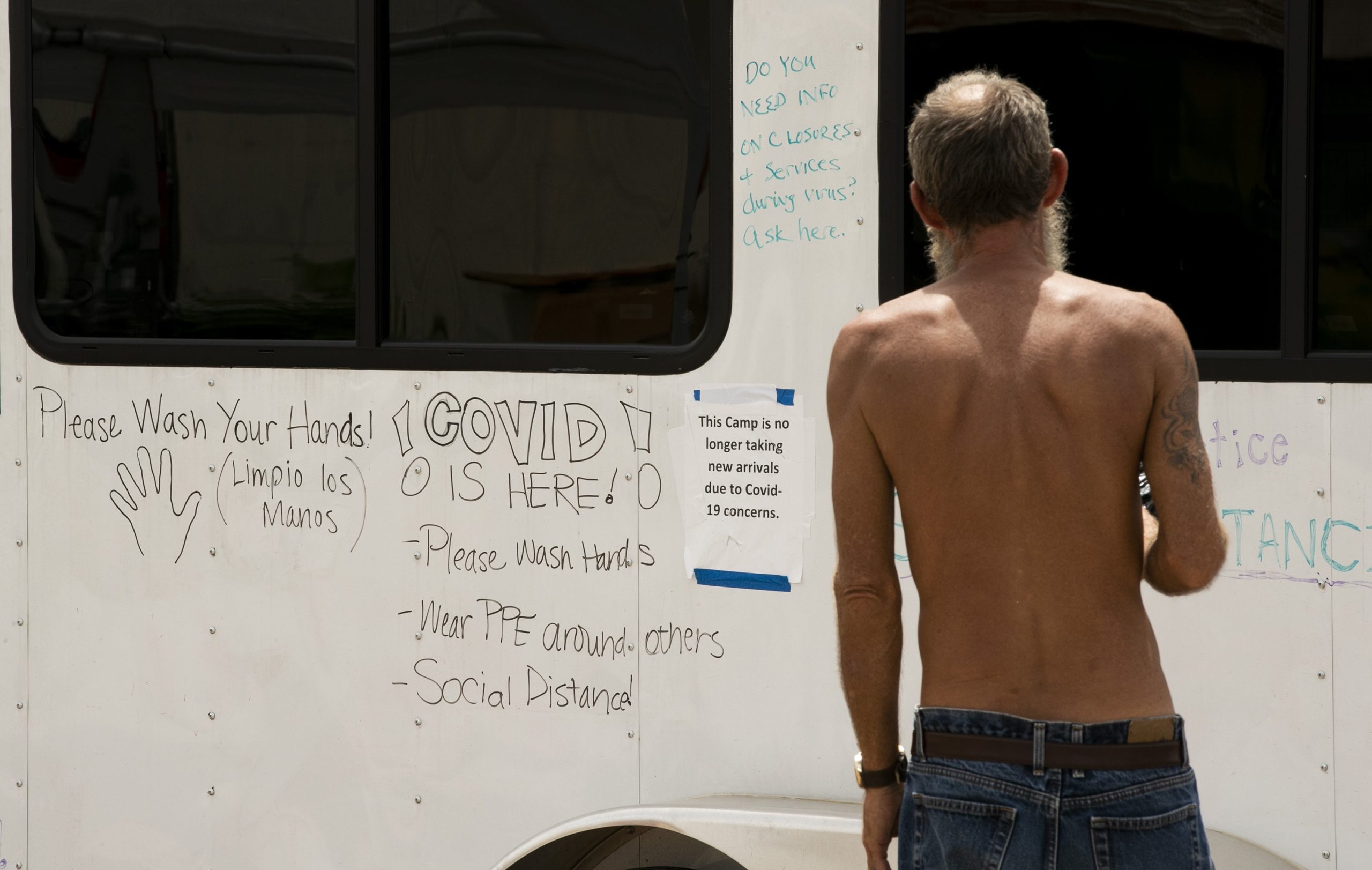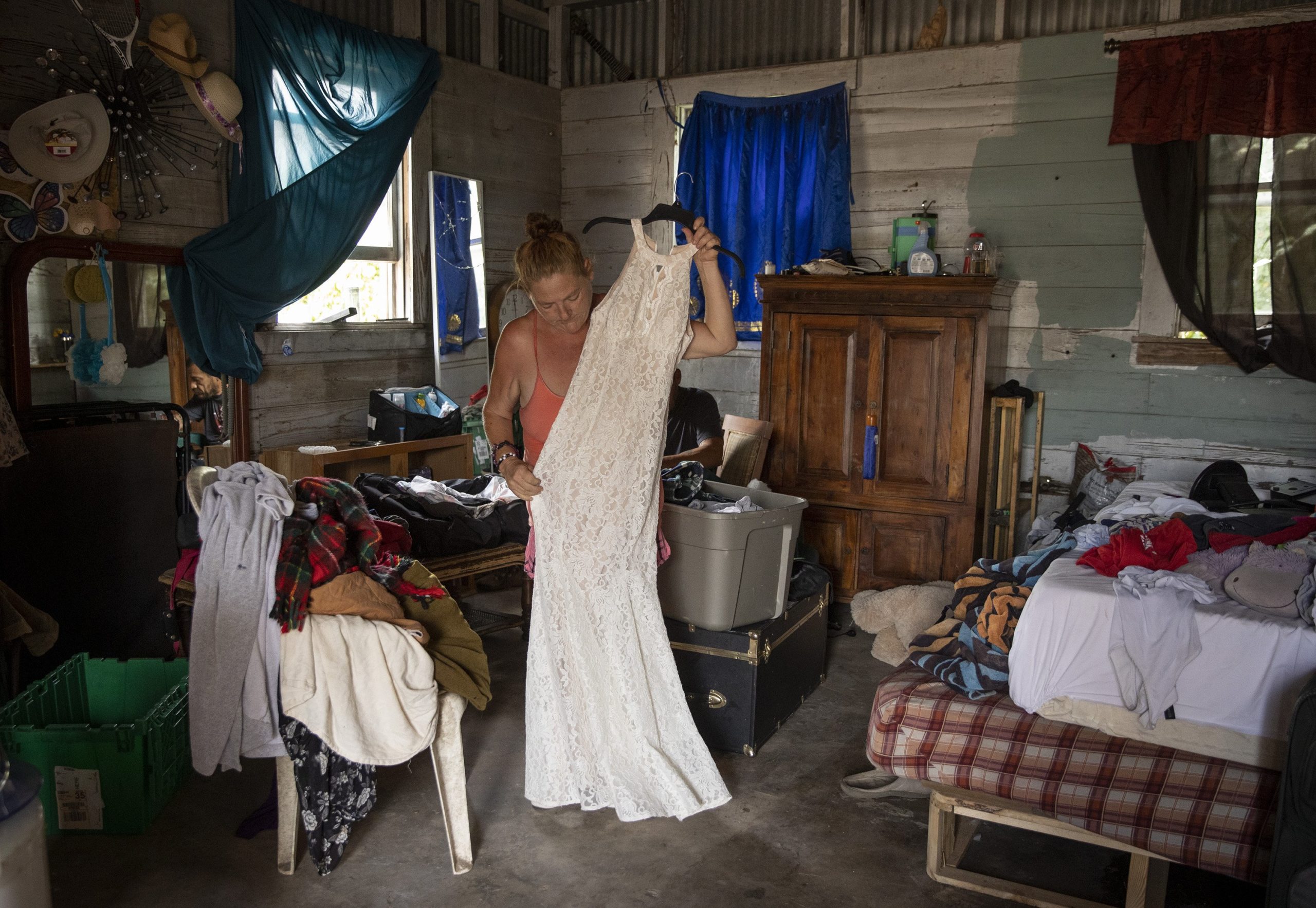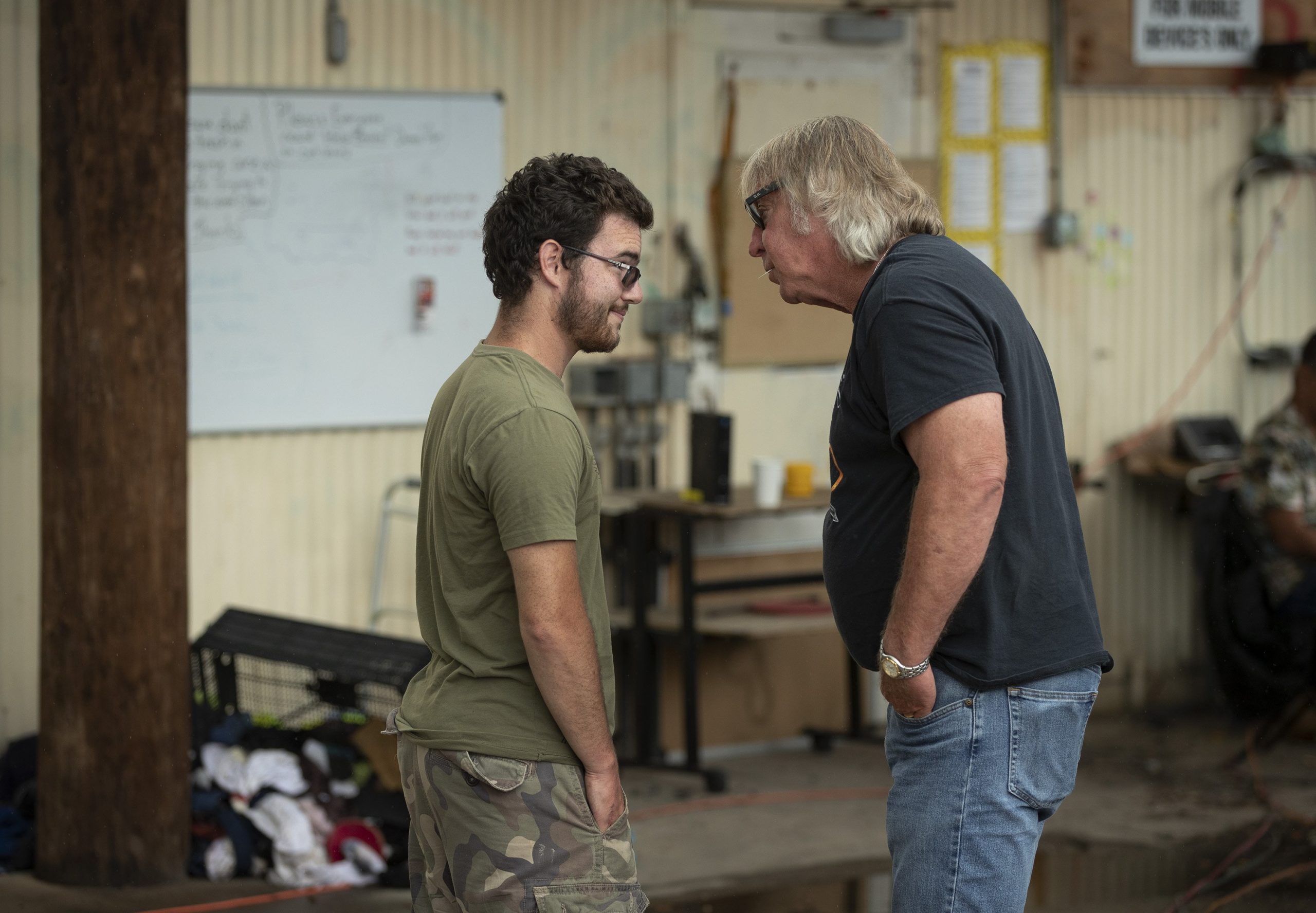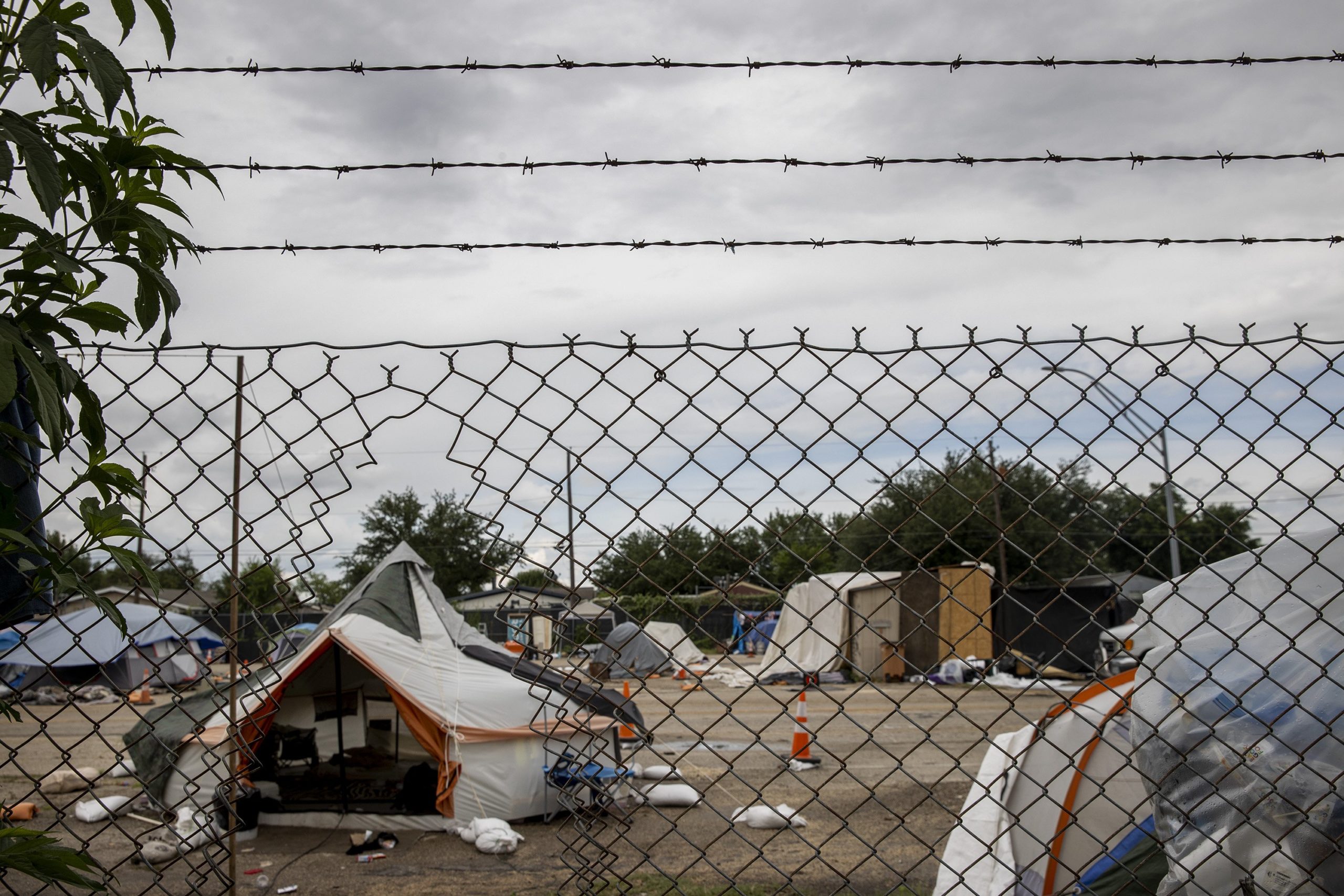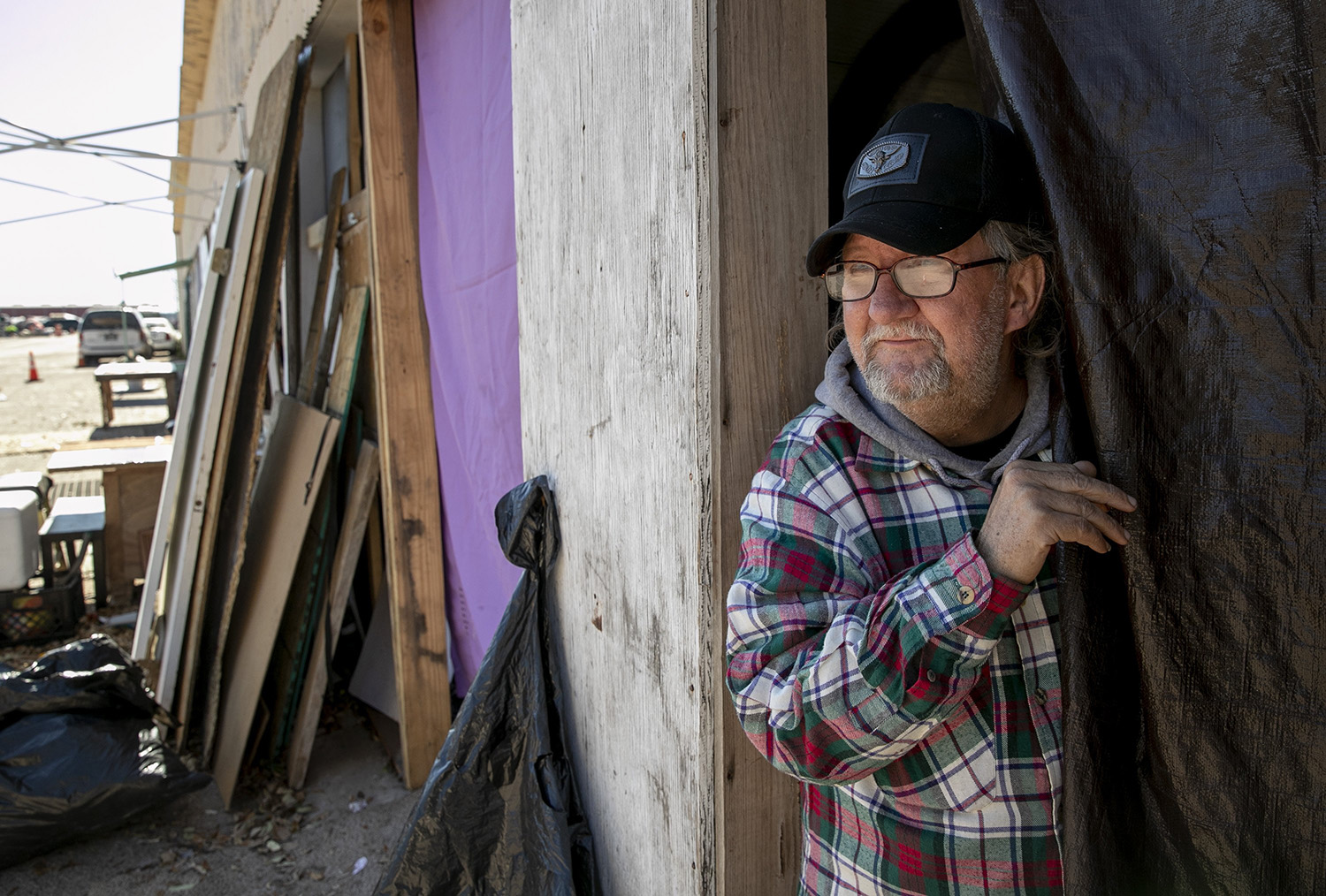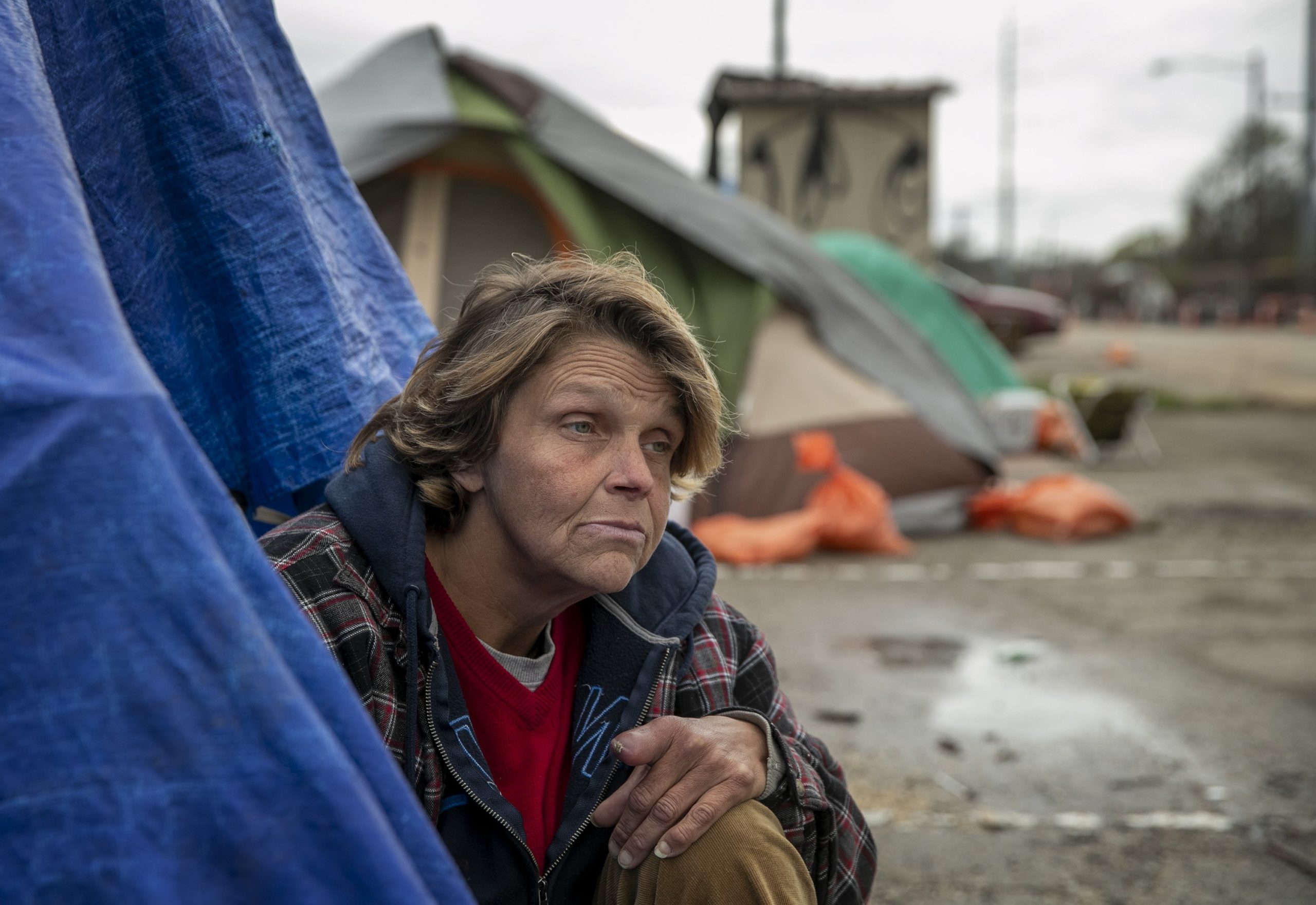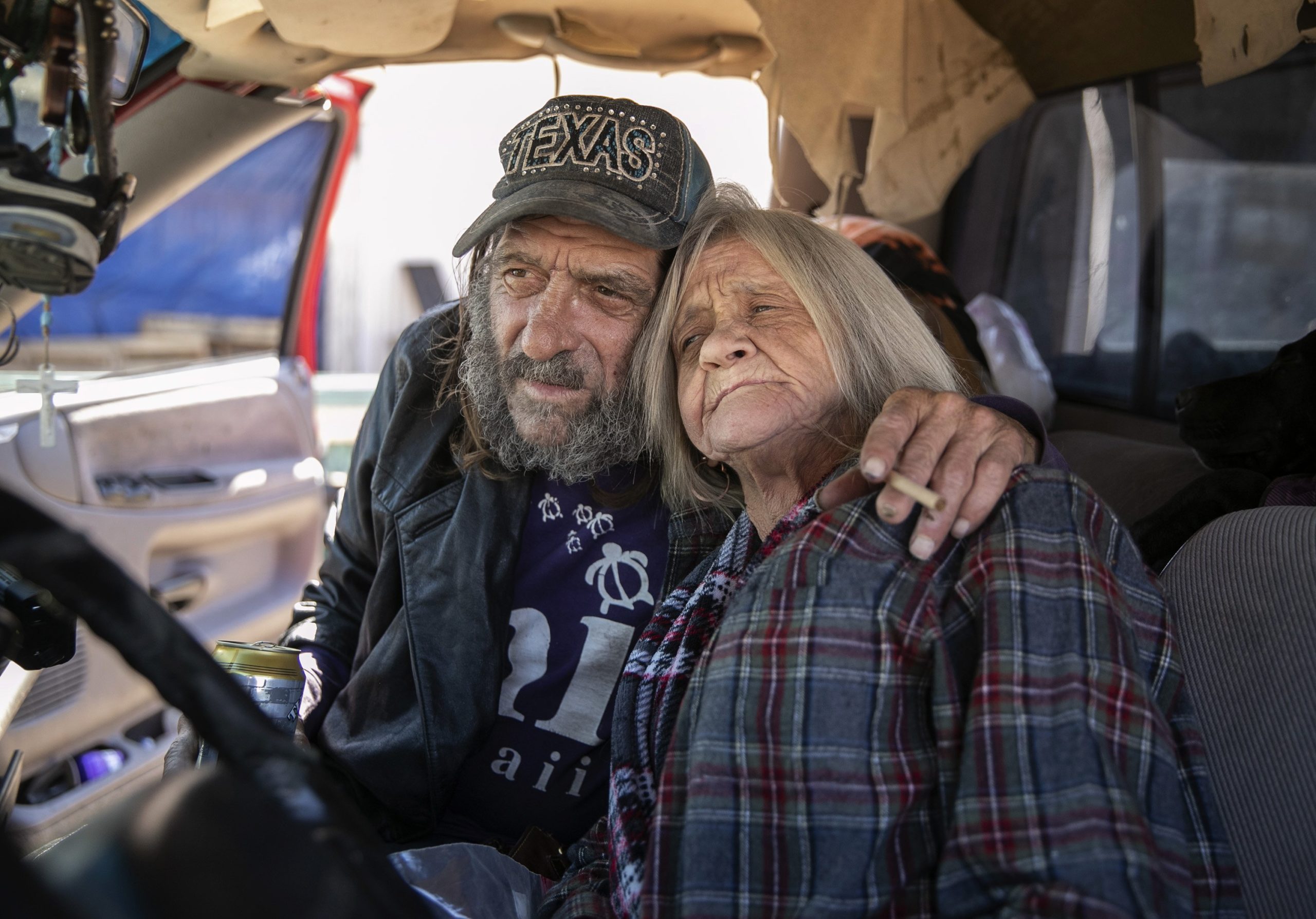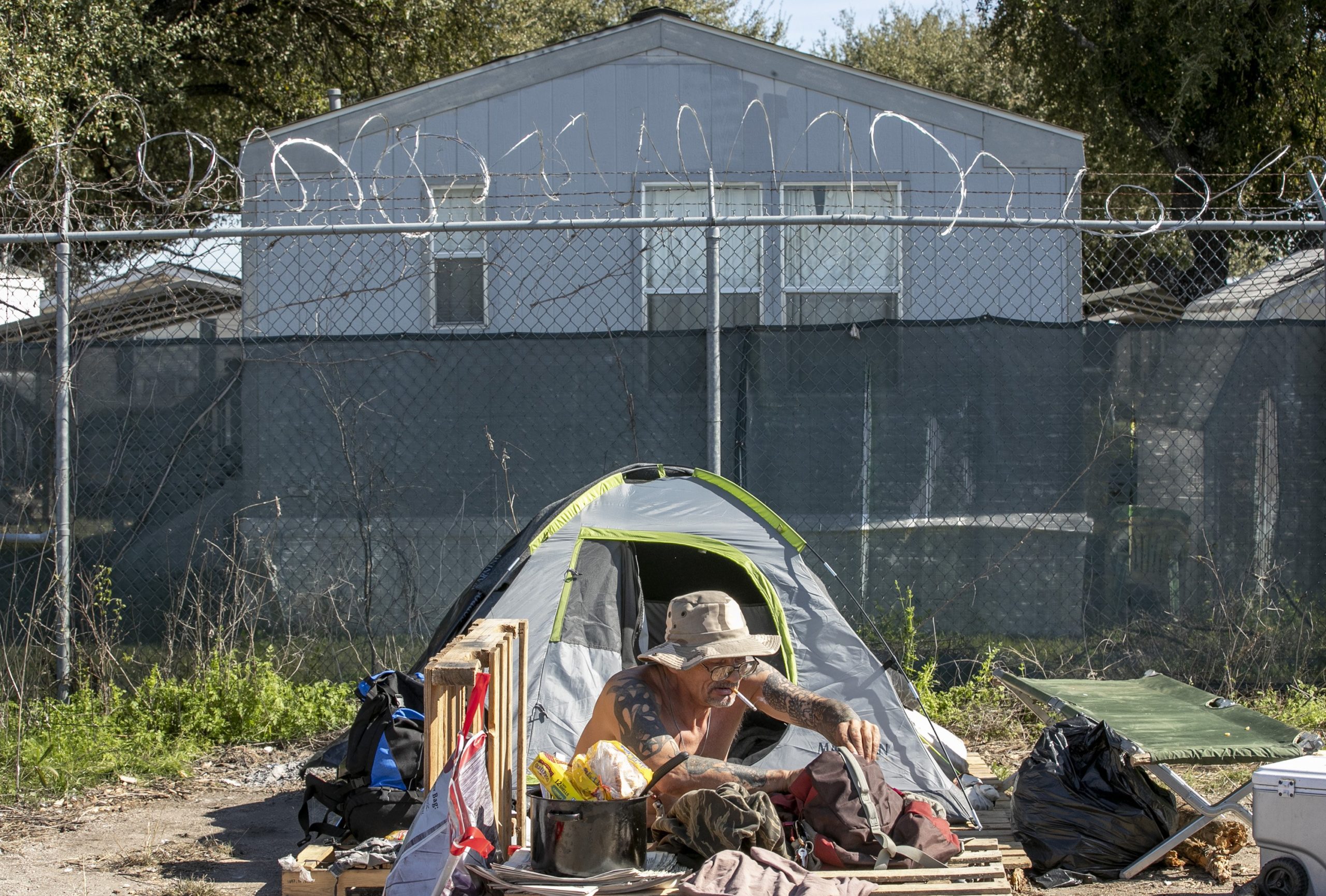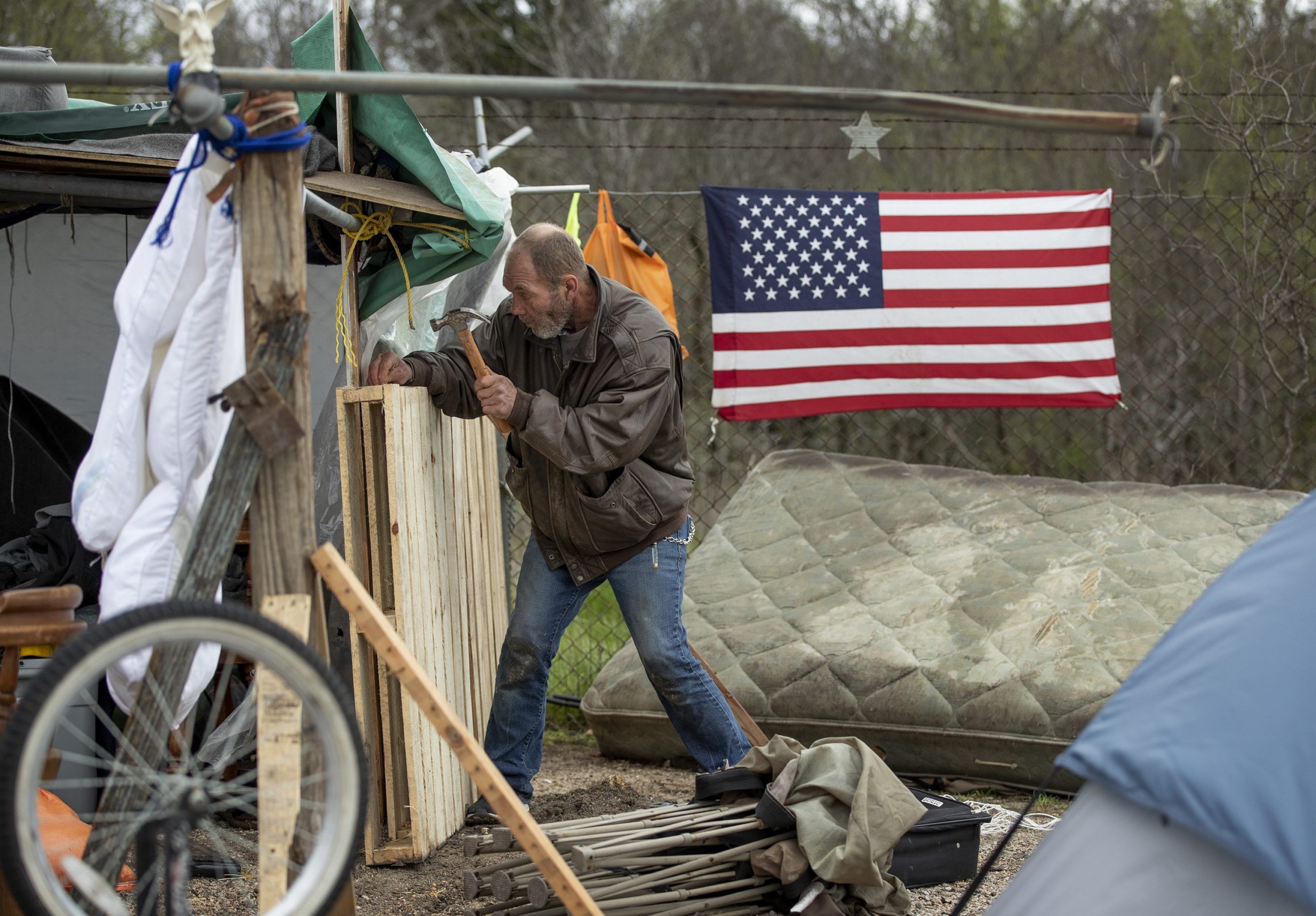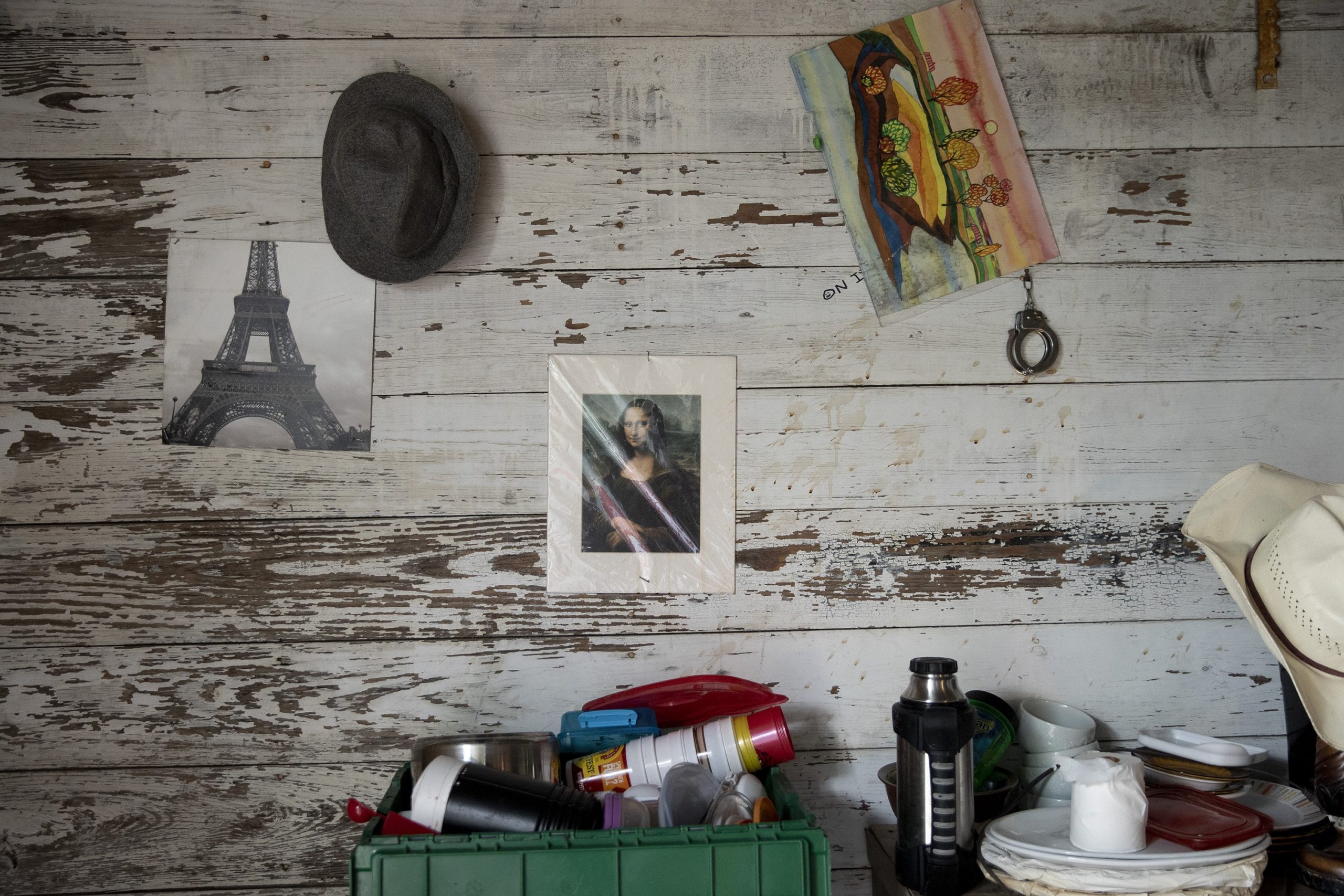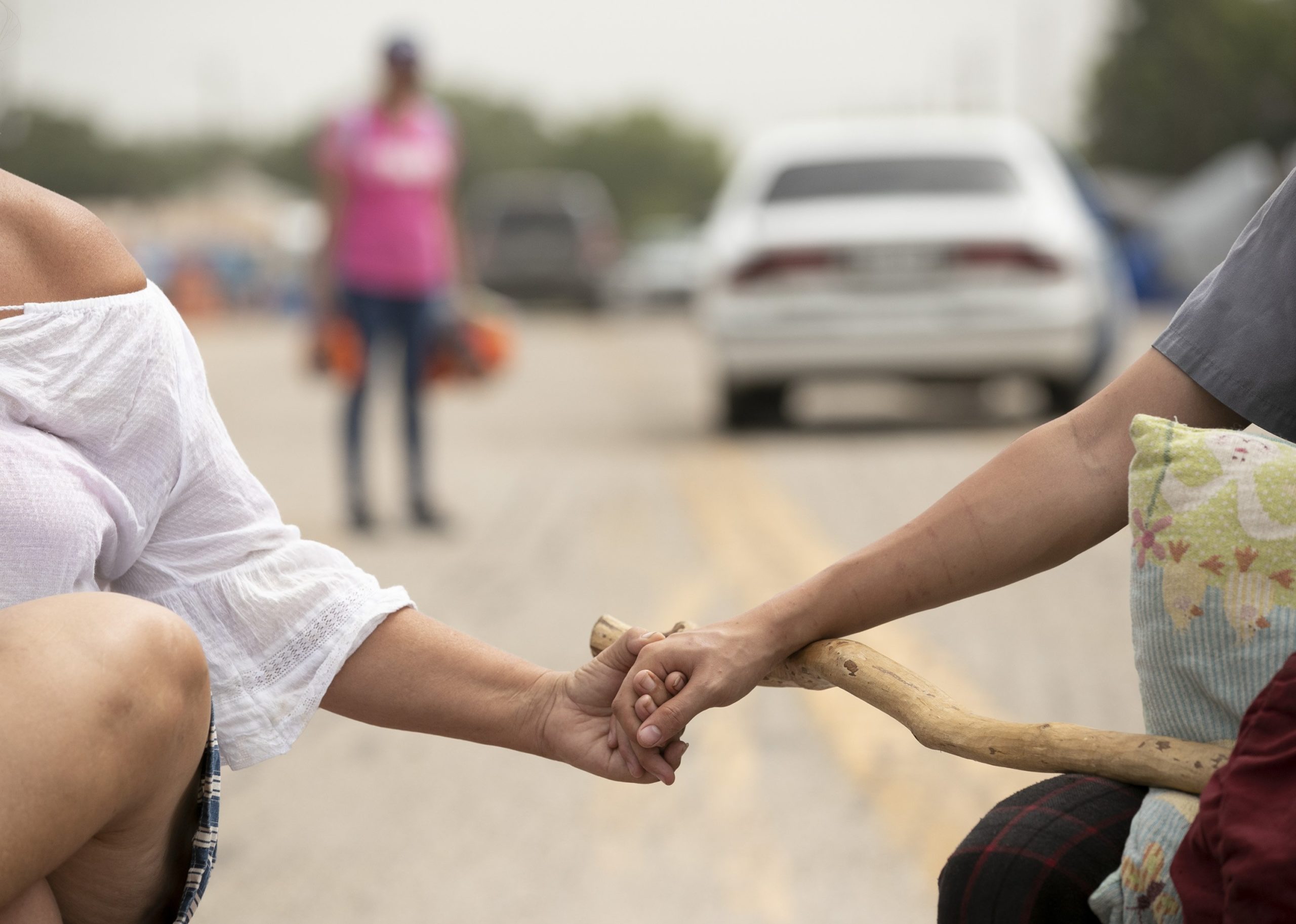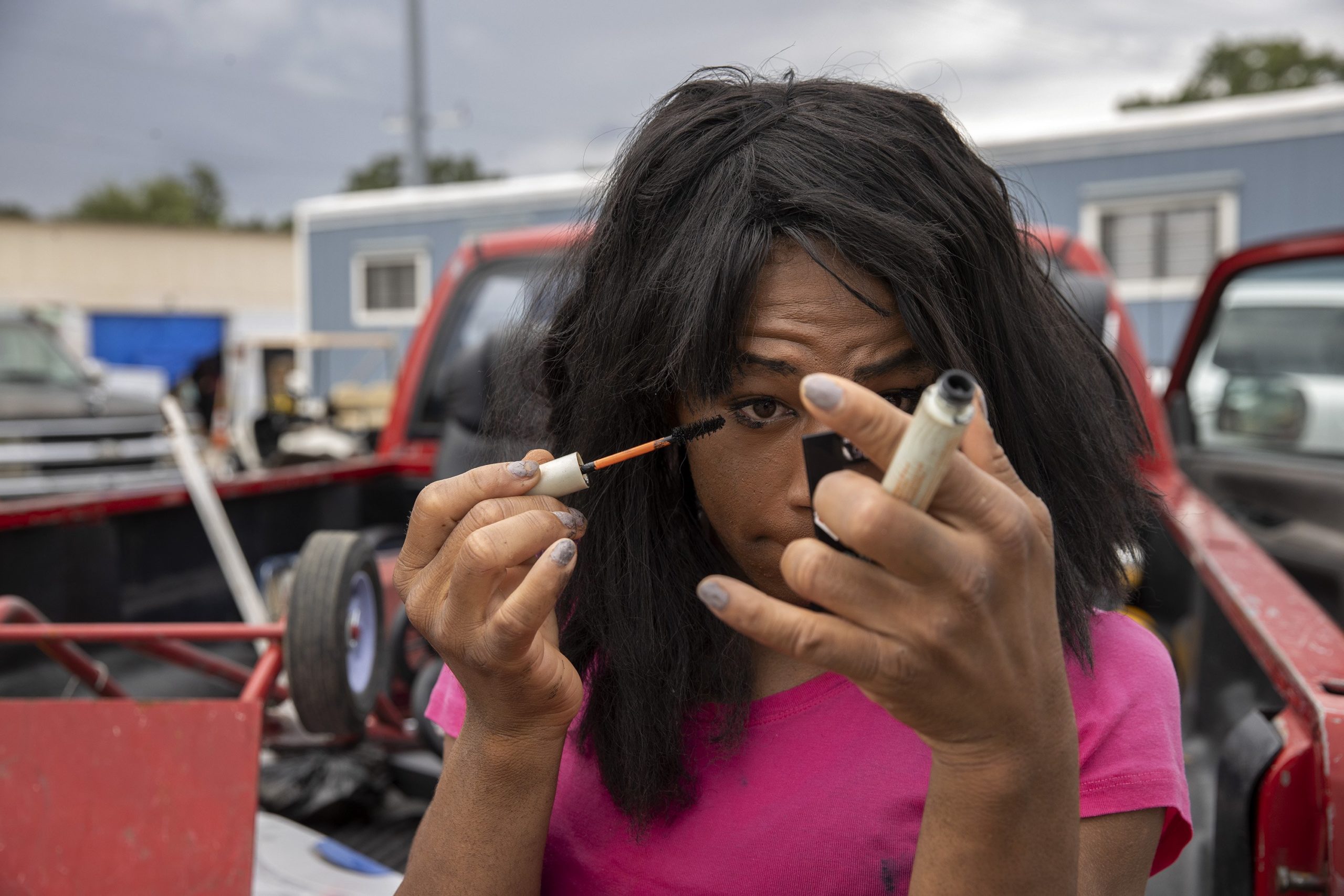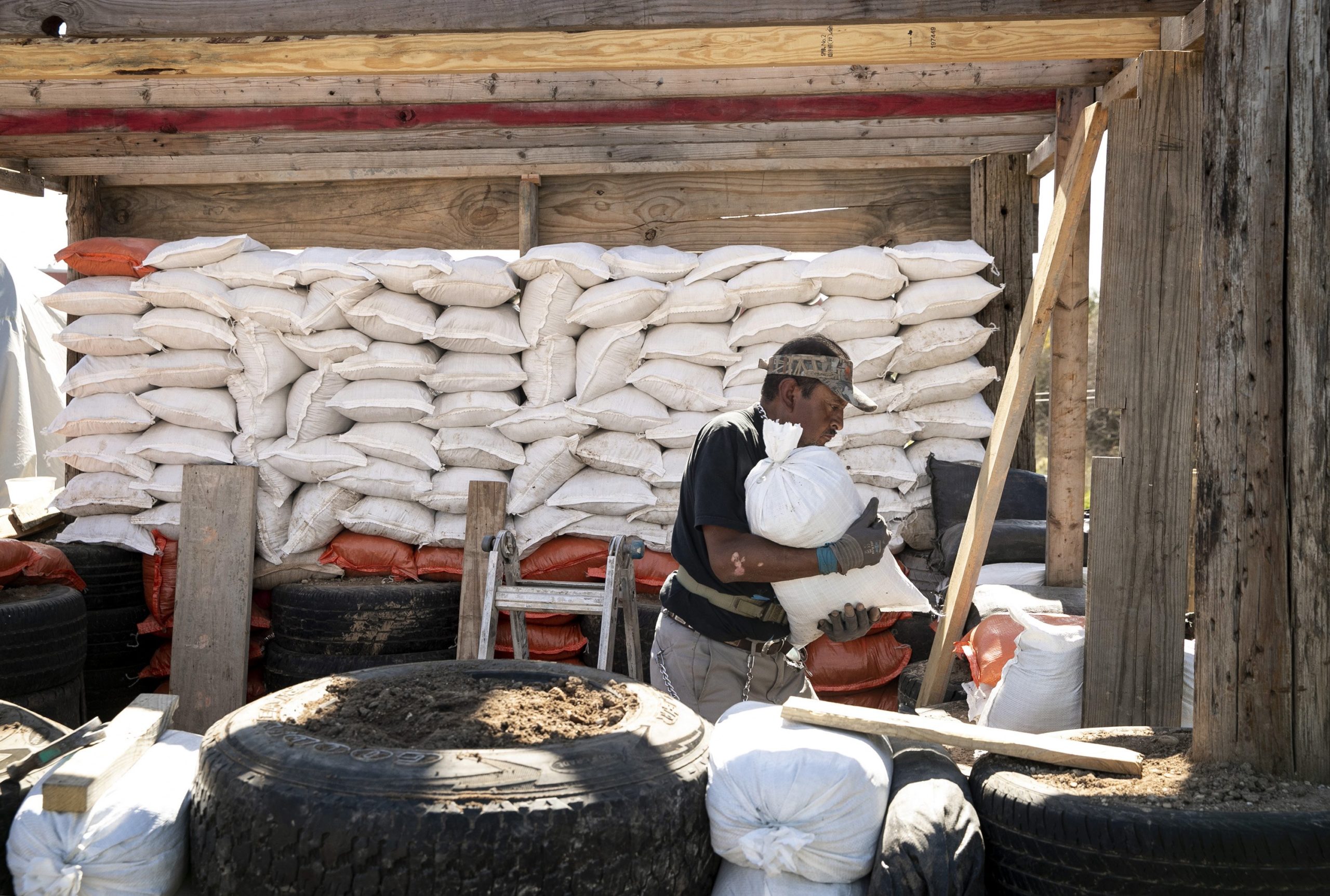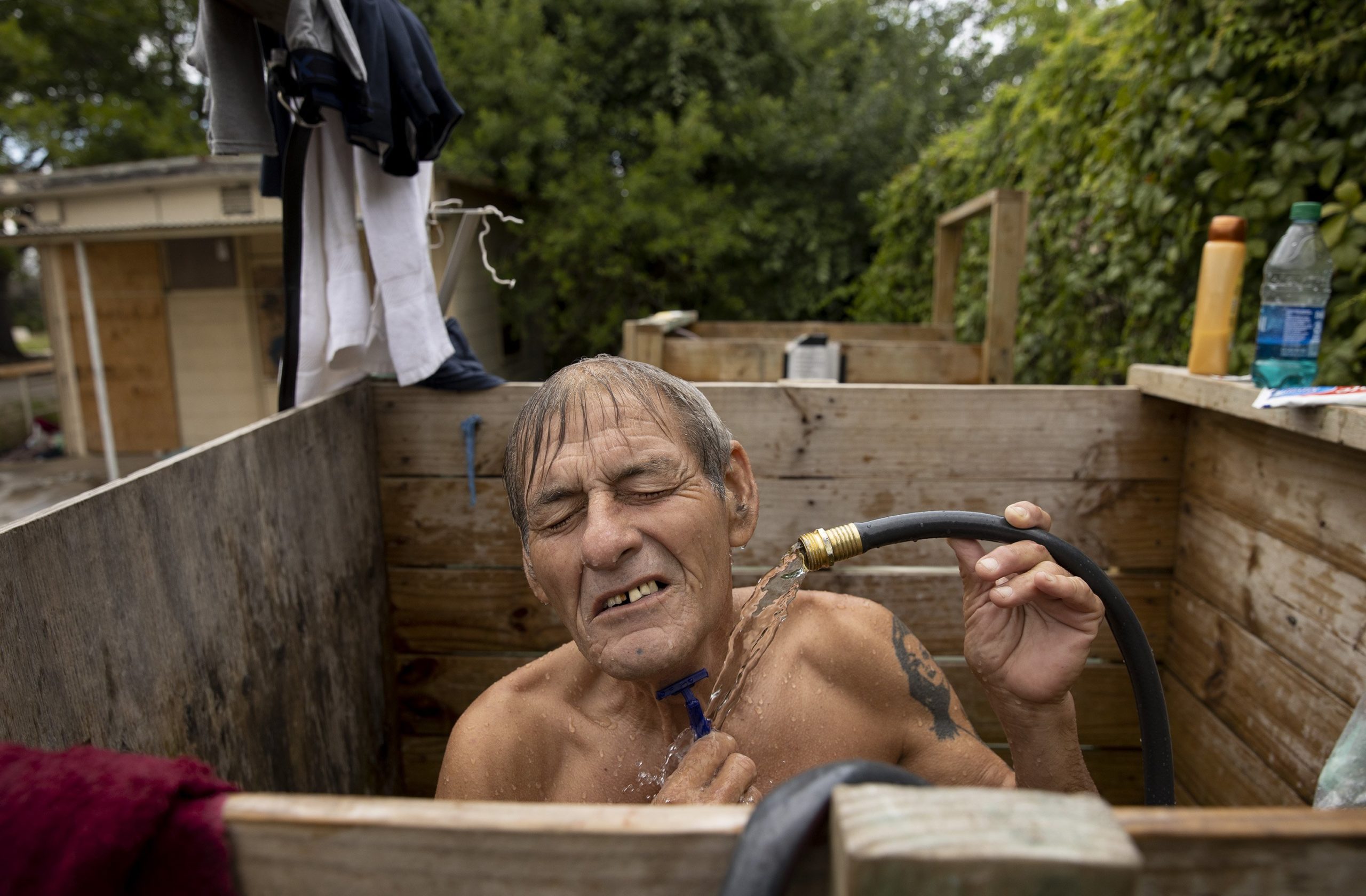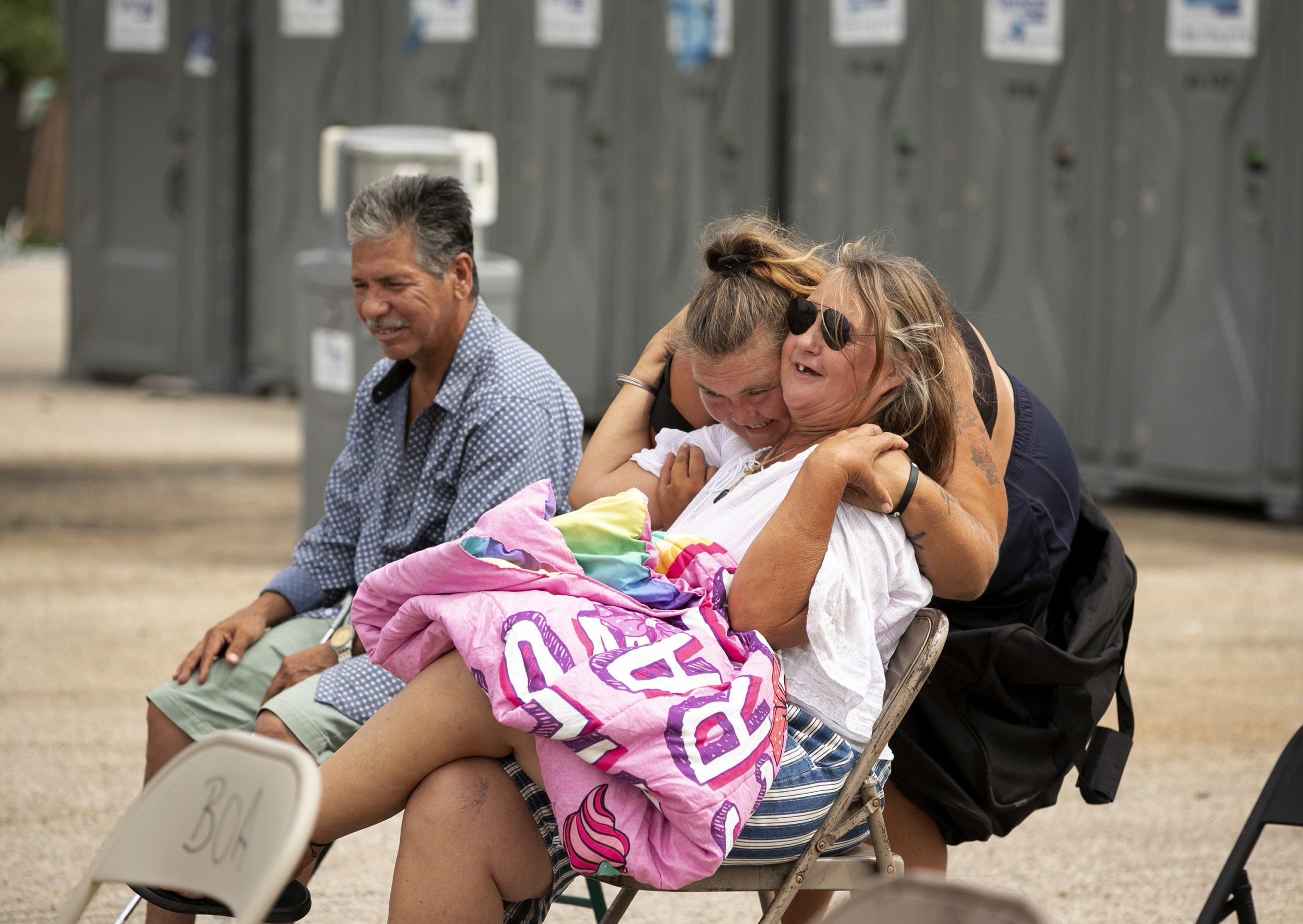Coronavirus derails efforts at Abbott’s homeless camp
Back in February, there was a sense of growing momentum at Gov. Greg Abbott’s designated campsite for homeless people in Austin.
Even though the Southeast Austin site along U.S. 183 near Montopolis Boulevard symbolized a flaring war between Abbott and the Austin City Council over homelessness, many of the camp’s earliest residents found unity in building a form of self-governance. A tech entrepreneur had stepped in to help the group create a website, a nonprofit, social media accounts and even a podcast.
Meanwhile, the Austin Chamber of Commerce worked to tamp down homelessness downtown by creating a nonprofit organization its leaders said would raise millions of dollars from the local business community to create massive tents to house homeless people. Things seemed like they were looking up for the 120 or so residents of a place many had dubbed “Camp Abbott.”
Then came the coronavirus.
In the ensuing months, the Chamber of Commerce’s fledgling nonprofit ATX Helps hasn’t built a thing. A $1-a-year lease to operate the Texas Department of Transportation site offered in February appears scuttled as the nonprofit’s leadership mulls how to change course.
Now as the summer blooms, the tent encampments under Austin’s highways that dominated Abbott’s Twitter feed last fall appear to be little more than an afterthought. The stream of donations from groups and individuals have waned, leaving the 120 residents of a state-sponsored encampment wondering when significant aid will ever arrive.
The camp is situated along southbound U.S. 183 between an industrial equipment rental business and a pre-fab home neighborhood. The L-shaped lot is lined with chain-link fences and razor wire.
About 20 vehicle bays — once used for vehicle maintenance — stretch across the front of the property. Many of the bays have since been closed off by their new inhabitants, who have created makeshift doors.
Behind them, dozens of tents have been erected, many placed on top of old shipping pallets to avoid storm runoff when it rains. About 10 portable toilets line the rear of the property, where TxDOT set a boundary for tents to extend no further.
It is a spartan slab of concrete and asphalt. A single Texas Department of Public Safety trooper sits in a DPS vehicle, occasionally driving a slow loop through the site. Next to his parked vehicle sits a white trailer staffed by the Texas Division of Emergency Management. Numerous warnings and guidelines have been written in marker on the trailer where meals are distributed daily.
One stands out. “COVID is here!, it reads.
Messages on the Texas Division of Emergency Management trailer at a state-owned temporary campsite for homeless at a TxDOT facility in southeast Austin warn Russell Burns and others of the dangers of COVID-19 on June 27. [JAY JANNER/AMERICAN-STATESMAN]
Stephanie Baez looks at her wedding dress at a storage shed that serves as her home at a state-owned temporary campsite for homeless at a TxDOT facility in southeast Austin on June 24. Baez said she plans to marry her boyfriend in a ceremony at the camp as soon as they can get a marriage license. She said she became homeless four years ago when her husband died. [JAY JANNER/AMERICAN-STATESMAN]
Pastor George Crisp, right, of Angels Healing and Recovery Church, talks to William King, 23, Riverside, California, at a state-owned temporary campsite for homeless at a TxDOT facility in southeast Austin on June 24. King said he became homeless two months ago after getting evicted by his mother. [JAY JANNER/AMERICAN-STATESMAN]
Many at the camp feel like they have been neglected. Some worry the site is nothing more than a political football that got left on the one-yard line once the coronavirus pandemic began raging. The slide into perceived indifference has continued during the social upheaval from the police killing of George Floyd in Minneapolis. Put together, those events have cast a long shadow over what just four months ago was Austin’s key political issue.
“We are the forgotten,” said Kay, a 58-year-old woman who has been living at the campsite with her 17-year-old son Logan since November. “They put us here, and they forgot us, or they chose to not remember us.”
Like many interviewed for this story, Kay refused to give her last name, saying she fears that she would be permanently associated with the stigma of homelessness, a condition she hopes is only temporary.
We are the forgotten. They put us here, and they forgot us, or they chose to not remember us.
Homelessness had been the City Council’s key issue for several years. Austin City Manager Spencer Cronk made homelessness a cornerstone this year’s city budget, setting aside a record $62.7 million to address the issue. Now, Cronk is being pressured to remove a police chief he chose after a different crisis — the Austin bombings — because of police violence against protesters.
Homelessness has taken a back seat.
“There’s been a lot of promise of change, but not much has happened,” said Vanessa, who has lived at the site with her partner Andie since December.
Abbott’s office did not respond to a request for comment.
A hole in a fence leads to a state-owned temporary campsite for homeless at a TxDOT facility in southeast Austin on June 24. [JAY JANNER/AMERICAN-STATESMAN]
Problems for ATX Helps
Abbott opened up the 7-acre TxDOT maintenance yard as a campsite for homeless individuals in November after he ordered the state transportation department to remove encampments under state highways. Abbott’s action came after the City Council repealed a public camping ban months earlier.
At the time of Abbott’s announcement, Robert Rhodes had been camping about 2 miles away near Oltorf Street and South Pleasant Valley Road. Rhodes had been homeless off and on for more than 20 years. When he heard about Abbott’s camp, he and a friend packed up and came to the site. He was one of the first arrivals, snatching up one of about 20 maintenance bays that have become prime real estate at the site.
A scant number of people chose to stay at the campsite in the first few months. But as the winter weather warmed, the population swelled to more than 100, according to the Texas Division of Emergency Management, which staffs the trailer at the site 12 hours a day, seven days a week.
“It blew up like a balloon,” Rhodes said. “I loved it.”
Robert Rhodes looks out of his shelter, a former storage shed at a homeless camp on state-owned land that was once a TxDOT facility on Thursday February 27, 2020. Rhodes, who has been homeless for 10 years, said he was the first person to move into the camp. [JAY JANNER/AMERICAN-STATESMAN]
The Chamber of Commerce and the Downtown Austin Alliance took notice. The two organizations had already banded together to create a nonprofit organization called ATX Helps to address homelessness downtown.
ATX Helps had lofty goals. Its coalition of business leaders, faith-based groups and philanthropic organizations planned to raise $14 million over the next two years to help get tents off streets and out from under overpasses.
The plan would mimic a strategy in San Diego, building temporary shelters from massive tents called Sprung shelters. ATX Helps hoped to have a shelter up and running by early 2020.
However, it soon became apparent that ATX Helps was falling short on its fundraising goals. After initially eyeing areas downtown for a temporary shelter, the nonprofit appeared to have found a solution in Abbott’s campsite.
Under Abbott’s watch, the Texas Transportation Commission offered ATX Helps a $1-a-month lease to operate the site, build out services there and create a 150-bed shelter.
Many, like Rhodes, were skeptical about building a shelter at the TxDOT site. Some moved to the campsite because they couldn’t stand the lack of privacy at area shelters.
“People here are so used to having their own areas,” said Eve Caballero De La Rosa, a 47-year-old campsite resident who said she lost her home in East Austin to a reverse mortgage. “I don’t know if I could (move into the shelter). Half these people are not going to do that.”
Caballero De La Rosa won’t have to worry.
Deborah Swenson sits in her tent at a state-owned temporary campsite for homeless at a TxDOT facility in southeast Austin on Thursday February 20, 2020. Swenson said she became homeless four months ago in Shelburn, Indiana. She said she moved into the homeless camp in Austin two months ago where she was bit by a brown recluse spider, and lost a finger. [JAY JANNER/AMERICAN-STATESMAN]
Jay Clark hits a golf ball at a state-owned temporary campsite for homeless at a TxDOT facility in southeast Austin on June 24. Clark said he became homeless two years ago after getting kicked out of his grandparents’ house. [JAY JANNER/AMERICAN-STATESMAN]
Danny Silver and his wife Margaret Post sit in their truck at a state-owned temporary campsite for homeless at a TxDOT facility in southeast Austin on February 28. They have been married 21 years, and became homeless two years ago after getting evicted from their trailer home. Now they live in their truck in the homeless camp. “I just want to get home. I want a home so bad,” Post said. [JAY JANNER/AMERICAN-STATESMAN]
ATX Helps’ fundraising has been at a standstill for months, said Bill Brice, the vice president of investor relations for the Downtown Austin Alliance, who is a spokesman for ATX Helps. More pressing, placing homeless individuals into close quarters inside a shelter creates health risks, given the virulent nature of the coronavirus and its possible effect on a population that tends to be more vulnerable to infection than the housed.
There’s little debate that more housing for homeless people — be it shelters or permanent housing — was needed in Austin before the pandemic. But the virus has made things worse.
Austin’s shelters for people experiencing homelessness have reduced their bed capacity amid the pandemic. The Salvation Army and the Austin Resource Center for the Homeless both confirmed they have reduced the number of beds available since the pandemic began.
Citywide shelter capacity has been reduced 29%, from 778 beds to 551 amid the pandemic, a city of Austin spokeswoman said.
While ATX Helps promised to rapidly create at least 150 shelter beds, the nonprofit never signed the $1-a-month lease with TxDOT, Brice confirmed. That deal’s viability is unclear, with the nonprofit’s board voting recently to put off negotiating the lease for 90 days amid concerns about liability and direction related to the pandemic.
“The viability of opening a Sprung shelter has changed 180 degrees since the COVID-19 pandemic,” Brice said.
While the coronavirus blindsided ATX Helps and has put the nonprofit’s plans on hold, Mark Hilbelink, head pastor of Sunrise Community Church, offered a different diagnosis of the stalled efforts. He said the issues ATX Helps has encountered shows the lack of experience at the fledgling nonprofit, which has yet to hire a staff or spend any of the $1.5 million it has raised.
“They are business people trying to do social work,” Hilbelink said.
Marlon, who didn’t want to give his last name, sits by his tent a state-owned temporary campsite for homeless at a TxDOT facility in southeast Austin on February 28. The camp is separated from Palm Harbor Homes by a razor-wire fence. Marlon said he became homeless seven years ago after struggling with addiction and getting a divorce. He said he’s sober now. “I’m trying to get my life back together and get off the streets,” he said. [JAY JANNER/AMERICAN-STATESMAN]
COVID-19 at Abbott’s camp
The pandemic has not spared the campsite. Texas Division of Emergency Management spokesman Seth Christensen said four people have tested positive for COVID-19 at the site. The most recent case was detected about two months ago.
Health care organization CommUnityCare conducted coronavirus testing at the site, but testing was not mandatory.
The four people who tested positive were offered rooms at city-owned hotels that are being used for quarantine. However, not everyone took the city up on that offer.
“We can’t force anyone to go where they wouldn’t want to go,” Christensen said.
Masks were distributed to all residents at the site, Christensen said. But few wear them on site. The sight of a mask is seen as an obvious giveaway that the wearer is not a resident.
And some at the site say they believe the whole pandemic is overblown.
“People are ranting like it is polio or something,” said Andie, who has been living inside his disabled Dodge Caravan at the site with his girlfriend Vanessa and dog Chico.
To people at the site like Andie, the virus can seem like a low priority when you are more worried about a rainstorm flooding your tent, ravenous mosquitoes or having your belongings plundered.
Douglas Curtis builds a shelter with donated pallets at a state-owned temporary campsite for homeless at a TxDOT facility in southeast Austin on Thursday February 20, 2020. He said he became homeless 12 years ago for a number of reasons, and he displays the United States flag ?Because I?m an American,? he said. [JAY JANNER/AMERICAN-STATESMAN]
“Camp R.A.T.T.” unfurls
Ask any resident what they call the campsite and they’ll likely have a different name. Officially, it is known as 780 South U.S. 183. Others refer to it as “Camp Abbott” or “Abbottville” after the governor.
But in early 2020, another name appeared to be catching on: “Camp R.A.T.T.”
The name, which stands for Responsible Adult Transition Town, came about after several of the earlier residents began organizing, forming a makeshift governing board.
Aided by a tech entrepreneur with ties to efforts to recall Mayor Steve Adler and a petition to bring back the camping ban, they formed a nonprofit of their own.
Rhodes, a 55-year-old with a graying beard, became the de facto spokesman for the group by placing his cellphone number on the group’s website. He soon found himself doing multiple interviews a day with local, regional and even international media.
The group tried to get TxDOT to offer it the $1-a-month lease instead of ATX Helps.
Art hangs on the wall of a storage shed that serves as the home for Manny and Stephanie Baez at a state-owned temporary campsite for homeless at a TxDOT facility in southeast Austin on June 24. [JAY JANNER/AMERICAN-STATESMAN]
Meanwhile, Kent Dahlgren, 52-year-old CEO of software company 214 Alpha, thought he could bring his software model to the group.
His company could serve as a portal for fundraising, taking 20% of all funds raised. The rest would go to Camp R.A.T.T.’s nonprofit, Hands for Hope Austin.
But in the ensuing months, any glimmer of self-governance at the TxDOT campsite has fallen apart. Rhodes left the site frustrated, after many of his possessions were stolen while he was away from the camp for about a week. The maintenance bay he had called home was also taken by a different resident.
“They might have declared a self-governing committee, but they completely imploded,” Dahlgren said.
Rhodes’ caseworker found him funding for a hotel room at a La Quinta Inn off Interstate 35. Given the hot temperatures, Rhodes said he is enjoying where he is staying more than Camp R.A.T.T.
“I am so glad I left,” Rhodes said. “I am more at peace now than I was over there. I don’t have to worry about thievery, drug addicts.”
The group raised only enough money to file paperwork seeking tax exempt status, to create a limited liability corporation and to register a website, Dahlgren said. It has largely been placed on hiatus. State filings still list him as a director for the organization along with Rhodes and Chuck O’Rourke, another early resident of the campsite.
But Dahlgren’s efforts to address homelessness continue.
Dahlgren told the American-Statesman that three plots of land will be donated to the organization to create communities for homeless individuals organized in the same vein as what he once envisioned for Camp R.A.T.T.
Dahlgren wouldn’t give exact locations of the possible camps, but said one is near Parmer Lane while the other two are near Manor and Cameron. He also did not say who was providing the land, but said more details would be made public soon.
“A lot has happened in six weeks,” he said.
People experiencing homelessness hold hands during an outdoor worship service with Angels Healing and Recovery Church at at a state-owned temporary campsite for homeless at a TxDOT facility in southeast Austin on Saturday June 27, 2020. [JAY JANNER/AMERICAN-STATESMAN]
The Other Ones Foundation
Residents at the TxDOT site have noticed the recent arrival of a new nonprofit organization, The Other Ones Foundation.
The group offers low barrier employment for people experiencing homelessness. Many of the jobs it offers come through the city of Austin, which expanded its contract in October to pay for cleanup efforts at parks and other public land.
The Other Ones’ involvement at the TxDOT campsite came about almost by happenstance. Many of the group’s leaders and volunteers came into contact with TxDOT staff during sweeps of encampments under state highways.
PHOTOS: Inside Texas Gov. Abbott’s Austin homeless camp
The Other Ones volunteers were there to save the belongings of homeless individuals from ending in a trash heap. They began talking with the TxDOT staff, and a relationship was formed.
Chris Baker, the foundation’s executive director, said he was initially skeptical about working at the TxDOT site after the idea was floated. However, the timing made sense.
The Other Ones needed a new place to operate, and placing its office at a site where 120 members of the homeless community were staying would allow volunteers to interact with the people they are hoping to help.
Their involvement could create tacit cooperation between Abbott and the City Council on efforts to address homelessness. While Baker said no city money will go toward his group’s efforts at Abbott’s encampment, it is highly likely that any homeless individuals staying at the state-sponsored camp who are given work from The Other Ones will find themselves benefiting from two governing bodies that were at war over homelessness just five months ago.
Candace Roseberry does her makeup at a state-owned temporary campsite for homeless at a TxDOT facility in southeast Austin on June 24. Roseberry said she became homeless a year ago after not being able to find a job. [JAY JANNER/AMERICAN-STATESMAN]
Roberto Salas Rodriguez, who has been homeless for seven years, builds at sturdy shelter out of salvaged lumber, tires and sandbags he filled with dirt at a state-owned temporary campsite for homeless at a TxDOT facility in southeast Austin on February 28. [JAY JANNER/AMERICAN-STATESMAN]
Simon Escobedo Jr., 67, washes and shaves in a cold water outdoor shower at a state-owned temporary campsite for homeless at a TxDOT facility in southeast Austin on June 24. Escobedo said he became homeless 10 years ago when he lost his job as a gas station cashier. [JAY JANNER/AMERICAN-STATESMAN]
Baker said the shift in the public’s attention from homelessness to the coronavirus and the Black Lives Matter movement could be an advantage.
“We have COVID and this huge spotlight on racial inequity — which is a good thing obviously — in some ways, it will make our work that we do and that we have been doing for years a little bit easier,” he said.
The Other Ones’ plans appear far less hands-on than what ATX Helps originally envisioned.
“We aren’t coming in and taking over the show,” Baker said. “We are just moving there to be close to people.”
So far, that effort has been moving in bits and pieces over time while conducting needs assessment surveys of the camp’s roughly 120 residents. Baker said the foundation hopes to bring a shower station, on-site laundry and some cooking equipment there. Eventually, it hopes to build a shared space with air conditioning.
The Other Ones Foundation has a one-year agreement with TxDOT to have an office at the site.
The homeless community at the site seems cautiously optimistic. There have been a lot of promises made for the residents of the L-shaped property with little follow-through so far.
And some even worry that if life is made too easy at the campsite, it will lull them into acceptance of a life without a home to call their own.
Kay, the resident who has stayed at the campsite with her son Logan since November, has resisted decorating her space there. She has refused to shore up her maintenance bay with a wall in part because of the heat, but also because she doesn’t want to get comfortable.
Vanessa Stone, hugs, Dalzell Waldrop, seated, during an outdoor worship service with Angels Healing and Recovery Church at a state-owned temporary campsite for homeless at a TxDOT facility in southeast Austin on June 27, 2020. Waldrop, who said she suffered years of abuse, moved into the camp in January after being released from a mental hospital. Stone said she has been homeless off-and-on most of her life. [JAY JANNER/AMERICAN-STATESMAN]
“This is not my home,” she said. “I refuse to make it my home.”
“Some of these people are content here, and that’s fine for them,” she said. “I don’t judge these people around here. Who am I to judge them? We’re all on the same situation. It’s just that I want to get out of here. Not for me, but for my child.”
Last year, Kay lived in an apartment off South Congress Avenue. She worked in a call center but was laid off.
After she exhausted all the aid she could find, she was evicted, she said. She stayed under the overpass at Ben White Boulevard and Menchaca Road for about a month before moving to Abbott’s campsite.
The stress of knowing she would have to move her belongings every week or two while TxDOT cleanup crews made their sweeps led her to leave.
“I wake up every day and cry because I don’t want to be here, but I don’t know how to get myself out of it,” Kay said. “Every day is a struggle. And you just have to, as I say, put your big girl pants on and just, you know, go through it.”
